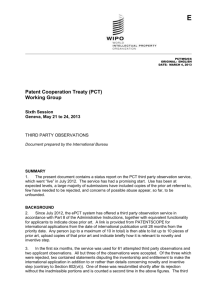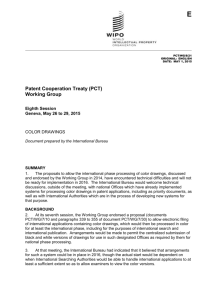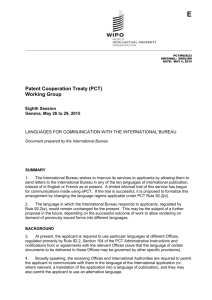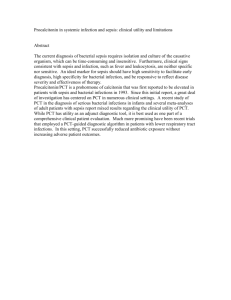PCT/WG/7/
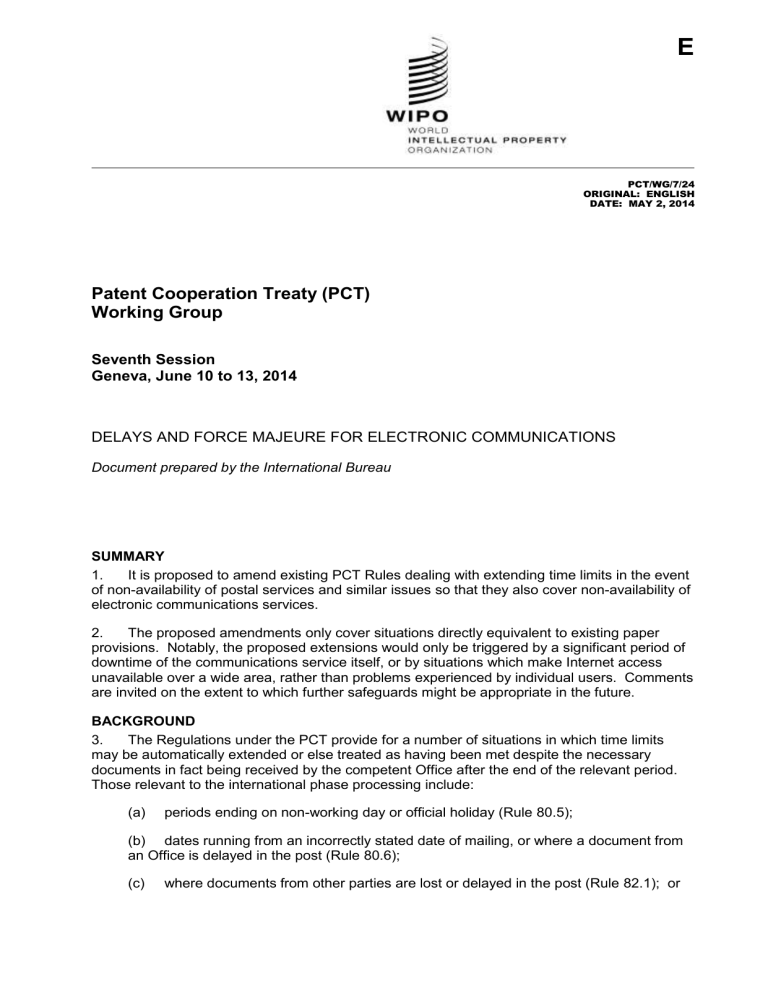
E
PCT/WG/7/24
ORIGINAL: ENGLISH
DATE: MAY 2, 2014
Patent Cooperation Treaty (PCT)
Working Group
Seventh Session
Geneva, June 10 to 13, 2014
DELAYS AND FORCE MAJEURE FOR ELECTRONIC COMMUNICATIONS
Document prepared by the International Bureau
SUMMARY
1. It is proposed to amend existing PCT Rules dealing with extending time limits in the event of non-availability of postal services and similar issues so that they also cover non-availability of electronic communications services.
2. The proposed amendments only cover situations directly equivalent to existing paper provisions. Notably, the proposed extensions would only be triggered by a significant period of downtime of the communications service itself, or by situations which make Internet access unavailable over a wide area, rather than problems experienced by individual users. Comments are invited on the extent to which further safeguards might be appropriate in the future.
BACKGROUND
3. The Regulations under the PCT provide for a number of situations in which time limits may be automatically extended or else treated as having been met despite the necessary documents in fact being received by the competent Office after the end of the relevant period.
Those relevant to the international phase processing include:
(a) periods ending on non-working day or official holiday (Rule 80.5);
(b) dates running from an incorrectly stated date of mailing, or where a document from an Office is delayed in the post (Rule 80.6);
(c) where documents from other parties are lost or delayed in the post (Rule 82.1); or
PCT/WG/7/24 page 2
(d) where a person was prevented from taking an action within the relevant time limit due to “war, revolution, civil disorder, strike, natural calamity or other like reason”
(Rule 82 quater .1).
4. These provisions were devised for a system where documents were provided on paper, either by post or over the counter at a national Office or similar physical agency. However, at present, around 90% of international applications are filed in electronic form and smaller but increasing number of post-filing documents are also provided electronically. Because these electronic filings make use both of the Internet and WIPO’s electronic systems, outages affecting either of these will negatively impact the applicant’s ability to file applications and submit related documents. And most often, any such system outages or widespread Internet connectivity issues will be beyond the control of the applicant.
5. Electronic transmissions are not subject to the possibility of delays in the post – in general, the applicant is able to see that a transmission has been completed and knows that the document is available to the relevant Office. However, the transmissions are subject to different risks of the services being unavailable for reasons which are outside the applicant’s control.
These risks are of the same general nature as those discussed above, but at present are not clearly covered by the relevant Rules.
6. The International Bureau is developing its infrastructure and support services to minimize the risk of system downtime and to ensure that service can be restored as quickly as possible in the event of any incident. Redundant systems are being put into place on different sites and connections to the Internet are made through multiple providers over separate physical connections. However, it is impossible to guarantee 100 per cent availability of services.
Furthermore, even if the central systems remain available, it is impossible to guard against loss of access by users due to problems with the intervening networks.
7. While it is generally desirable that users of the system should perform actions well in advance of time limits, in practice a significant number of events occur on the last day and by the time an electronic communication system fails, there may be little or no opportunity to use an alternative method of communication.
8. In the view of the International Bureau, it would be desirable to review the PCT
Regulations to ensure that they remain relevant to issues faced by applicants, Offices and third parties today and, in particular, to seek to mitigate any potential damage which may be caused to the rights of the applicant or third parties if problems with electronic processing systems prevent an action from being taken within a certain period.
REASONS FOR NON-AVAILABILITY OF IT SYSTEMS
9. Systems can be unavailable to users for several reasons:
(a) the system itself may not be working as expected – it may be completely unavailable or may have bugs preventing it from functioning as expected in a specific instance;
(b) the systems at the Office (International Bureau, receiving Office or International
Authority) may in themselves be functional, but Internet (or other relevant network) communications with the relevant Office are entirely cut off;
(c) the user may have problems specific to his local IT systems;
(d) Internet (or other relevant network) access may have become unavailable for reasons specific to the user’s own region; or
(e) t he user’s region may have been cut off from access by an event occurring elsewhere.
PCT/WG/7/24 page 3
10. In relation to items (c) to (e), above, the problems may be either total loss of Internet access, or loss of only certain services, whether types of network traffic or else destinations of network traffic.
EXTENT OF EXISTING OPTIONS
11. Problems with IT systems which can potentially cause problems for PCT users can currently be addressed in two ways:
(a) In the event of a catastrophic failure of IT systems within an Office, that Office can immediately declare itself closed for business for the duration of the IT system failure, as was the case for the International Bureau in 2011 when a fire caused the loss of all power to the Office and server rooms for two working days and part of the following weekend.
(b) Where the systems are unavailable to an individual applicant because of force majeure of the sorts referred to in Rule 82 quater .1, the affected party can provide evidence to that effect. However, loss of Internet access can occur for a wide range of reasons which are less extreme than the examples of situations provided in that Rule, where it is assumed that the postal services are resilient to most lesser circumstances.
PROPOSALS
12. It is proposed at this stage to address only issues with a direct equivalent to an existing provision for paper-based international applications, that is:
(a) to extend periods for performing actions if the relevant electronic systems are not available for a significant period of a day (proposed new Rule 80.5(iii), equivalent to the provision in existing Rule 80.5(ii) concerning days when mail is not delivered in the locality in which an Office is located); and
(b) to extend the force majeure provisions in Rule 82 quater .1 to include situations where there is widespread loss of power or access to electronic communication services in the locality where the interested party resides, has his place of business or is staying, not only to his own systems or building.
13. The Annex contains proposed amendments to Rules 80.5 and 82 quater .1 to address
these issues. It also contains the text of the other existing provisions referred to in paragraph 3
for ease of reference to assist consideration of other possible requirements for the future.
(a) Office’s Systems Unavailable
14. The proposal to add a new Rule 80.5(iii) covers the situations in paragraphs 9(a) and (b),
above, where an Office’s systems are entirely unavailable. The main issue in this case is to identify an appropriate threshold for when the provision should come into effect. While unavailability of systems is increasingly becoming a matter which prevents applicants and
Offices from working, it would be disproportionate to extend periods for actions in response to short-lived issues which do not cause significant difficulties. A loss of services for several hours very early in the morning may affect very few users, whereas even a short outage later on in the day may make it difficult for applicants to complete their work. Similarly, there is a great difference between planned outages which have been advertised in advance and for which at least regular users could be expected to allow for and outages which are unexpected and give no idea of when services can be expected to be restored.
15. Nevertheless, the International Bureau considers that any provision in this area needs to be clear in its own right, so that applicants do not need to wait to see whether an individual
Office considers a problem sufficiently large as to declare that it is closed for business in accordance with Rule 80.5(i). Furthermore, if a system is unavailable towards the end of the working day, an applicant should not be expected to wait until midnight to see whether services are restored. A suggested threshold is therefore an unplanned outage of two hours after
PCT/WG/7/24 page 4 midday in the timezone applied by the relevant system. In the case where an Office knows in advance that system maintenance will require IT systems to be unavailable for a large part of the day, it should still consider declaring itself entirely closed for business in accordance with
Rule 80.5(i).
16. Clearly, the introduction of such a provision would occasionally result in the extension of periods for applicants who were not affected by the problems with IT systems, for example because they were intending to send the relevant document or payment by a different means.
However, this is not readily avoidable and occurs already with the existing Rule 80.5, for example, where a person using electronic filing, which is usually available even when the Office is closed will gain an extension of periods for response as a result of the fact that the Office is closed or because mail is not delivered on a particular day. Moreover, there appears to be little opportunity for abuse since knowledge of an unplanned outage of electronic systems would come too late for a person to deliberately take advantage of the resulting extension of periods for documents received by mail.
(b) Systems Unavailable for Applicants in a Particular Region
17. The second proposal covers the situations referred to in paragraphs 9(d) and (e), above,
where electronic communications access is lost across a wide area. This term would require clarification or further guidelines to ensure consistent application across different Offices, but in line with the nature of the existing provisions in this Rule, it is intended to refer to unexpected outages covering a large area of a city or country, rather than localized problems within a building affecting only an individual.
18. The concerns referred to in paragraphs 15 and 16 do not apply to the proposal to amend
Rule 82 quater . In this case, in order to be excused from having failed to meet the time period, the applicant needs to provide evidence not only of the facts which caused the failure to meet the time limit, but that he took the necessary actions as soon as reasonably possible afterwards.
Consequently, the fact that electronic systems were unavailable in his region would only provide an excuse if this actually affected his ability to meet the time period and he takes the relevant action by some means, whether by using restored electronic services or by post, as soon as reasonably possible.
Other Situations
19. As noted in paragraph 9, above, there can be other reasons for which electronic systems
may be unavailable to an individual even though the system itself is functional. The
International Bureau would welcome comments on the extent to which it may be appropriate to extend safeguards to other situations and the evidence or safeguards for third parties which might be appropriate to such situations.
20. The Working Group is invited to:
(i) consider the proposed amendments to the Regulations set out in the Annex to this document; and
(ii) comment on the extent to which additional safeguards may be desirable .
[Annex follows]
PCT/WG/7/24
ANNEX
PROPOSED AMENDMENTS TO THE PCT REGULATIONS 1
TABLE OF CONTENTS
1 Proposed additions and deletions are indicated, respectively, by underlining and striking through the text concerned.
PCT/WG/7/24
Annex, page 2
Rule 80
Computation of Time Limits
80.1 to 80.4 [No change]
80.5 Expiration on a Non-Working Day or Official Holiday
If the expiration of any period during which any document or fee must reach a national
Office or intergovernmental organization falls on a day:
(i) on which such Office or organization is not open to the public for the purposes of the transaction of official business;
(ii) on which ordinary mail is not delivered in the locality in which such Office or organization is situated;
(iii) on which the systems of the Office or organization for submitting the relevant document or fee electronically are unavailable to users for a period of more than two hours without prior notice, after midday in the locality of the Office or organization;
(iii) (iv) which, where such Office or organization is situated in more than one locality, is an official holiday in at least one of the localities in which such Office or organization is situated, and in circumstances where the national law applicable by that Office or organization provides, in respect of national applications, that, in such a case, such period shall expire on a subsequent day; or
(iv) (v) which, where such Office is the government authority of a Contracting State entrusted with the granting of patents, is an official holiday in part of that
Contracting State, and in circumstances where the national law applicable by that
Office provides, in respect of national applications, that, in such a case, such period shall expire on a subsequent day; the period shall expire on the next subsequent day on which none of the said four five circumstances exists.
PCT/WG/7/24
Annex, page 3
[Rule 80, continued]
80.6 [No change] Date of Documents
Where a period starts on the day of the date of a document or letter emanating from a national Office or intergovernmental organization, any interested party may prove that the said document or letter was mailed on a day later than the date it bears, in which case the date of actual mailing shall, for the purposes of computing the period, be considered to be the date on which the period starts. Irrespective of the date on which such a document or letter was mailed, if the applicant offers to the national Office or intergovernmental organization evidence which satisfies the national Office or intergovernmental organization that the document or letter was received more than seven days after the date it bears, the national Office or intergovernmental organization shall treat the period starting from the date of the document or letter as expiring later by an additional number of days which is equal to the number of days which the document or letter was received later than seven days after the date it bears.
80.7 [No change]
PCT/WG/7/24
Annex, page 4
Rule 82
Irregularities in the Mail Service
82.1 [No change] Delay or Loss in Mail
(a) Any interested party may offer evidence that he has mailed the document or letter five days prior to the expiration of the time limit. Except in cases where surface mail normally arrives at its destination within two days of mailing, or where no airmail service is available, such evidence may be offered only if the mailing was by airmail. In any case, evidence may be offered only if the mailing was by mail registered by the postal authorities.
(b) If the mailing, in accordance with paragraph (a), of a document or letter is proven to the satisfaction of the national Office or intergovernmental organization which is the addressee, delay in arrival shall be excused, or, if the document or letter is lost in the mail, substitution for it of a new copy shall be permitted, provided that the interested party proves to the satisfaction of the said Office or organization that the document or letter offered in substitution is identical with the document or letter lost.
(c) In the cases provided for in paragraph (b), evidence of mailing within the prescribed time limit, and, where the document or letter was lost, the substitute document or letter as well as the evidence concerning its identity with the document or letter lost shall be submitted within one month after the date on which the interested party noticed – or with due diligence should have noticed – the delay or the loss, and in no case later than six months after the expiration of the time limit applicable in the given case.
(d) Any national Office or intergovernmental organization which has notified the
International Bureau that it will do so shall, where a delivery service other than the postal authorities is used to mail a document or letter, apply the provisions of paragraphs (a) to (c) as if the delivery service was a postal authority. In such a case, the last sentence of paragraph (a) shall not apply but evidence may be offered only if details of the mailing were recorded by the delivery service at the time of mailing. The notification may contain an indication that it applies only to mailings using specified delivery services or delivery services which satisfy specified criteria. The International Bureau shall publish the information so notified in the Gazette.
(e) Any national Office or intergovernmental organization may proceed under paragraph (d):
(i) even if, where applicable, the delivery service used was not one of those specified, or did not satisfy the criteria specified, in the relevant notification under paragraph (d), or
PCT/WG/7/24
Annex, page 5
[Rule 82.1, continued]
(ii) even if that Office or organization has not sent to the International Bureau a notification under paragraph (d).
PCT/WG/7/24
Annex, page 6
Rule 82quater
Excuse of Delay in Meeting Time Limits
82 quater .1 Excuse of Delay in Meeting Time Limits
(a) Any interested party may offer evidence that a time limit fixed in the Regulations for performing an action before the receiving Office, the International Searching Authority, the
Authority specified for supplementary search, the International Preliminary Examining Authority or the International Bureau was not met due to war, revolution, civil disorder, strike, natural calamity , widespread and unexpected loss of access to electronic communications services or other like reason in the locality where the interested party resides, has his place of business or is staying, and that the relevant action was taken as soon as reasonably possible.
(b) [No change] Any such evidence shall be addressed to the Office, Authority or the
International Bureau, as the case may be, not later than six months after the expiration of the time limit applicable in the given case. If such circumstances are proven to the satisfaction of the addressee, delay in meeting the time limit shall be excused.
(c) [No change] The excuse of a delay need not be taken into account by any designated or elected Office before which the applicant, at the time the decision to excuse the delay is taken, has already performed the acts referred to in Article 22 or Article 39.
[End of Annex and of document]
